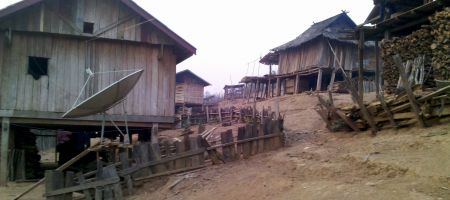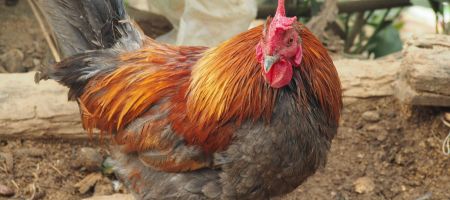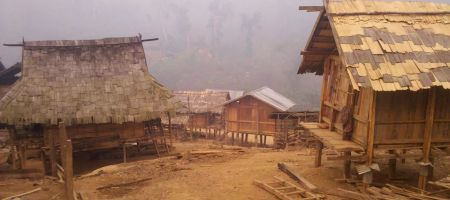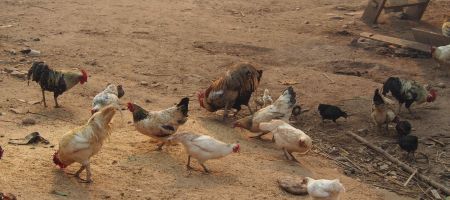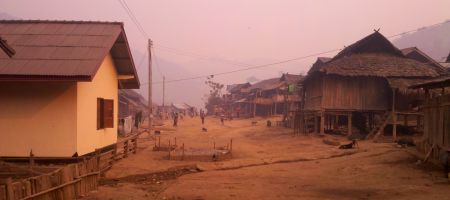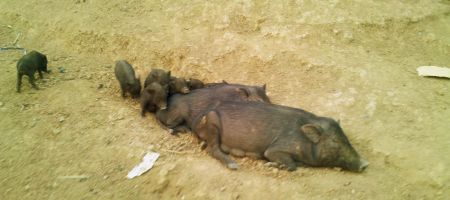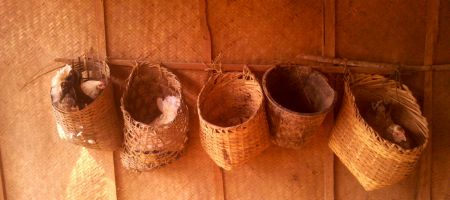Adventures of Longleg - Part II: Pigs and Television
In the late afternoon, we arrived at the village inhabited by people from the Akha ethnic group, Nam Lo, population 500. The village was quite the culture shock. I think I have never seen so many animals, pigs, chicken, dogs and cows in one place. So many children, it looked as if the place was run by them.
We were shy to make photos of the people, so the only photos we have are very early in the morning with few people on it and a few from some animals running around freely in the village
Our guide told us that a dirt road leading up to the village as well as a power line and a few wells (taps) were just finished one year ago. A school had also already been built. Toilets are in planning. To see the changes rushing into the village now is very interesting, if not a bit sad:
Traditionally, their houses are completely built out of wood and bamboo. Now, the road made it easier for the villagers to acquire sturdier building materials from the town, most of all corrugated iron or pantiles for the roofs but I saw a few concrete beams lying around near the village’s toilet.
Traditionally, the Akha are nomadic farmers: They build a village, burn down the jungle around it and do a few decades of farming until the ground gets too barren. Then they move on and build a new village some kilometers away. The road, the wells, the electricity and longer-lasting buildings all contribute to the development of them to settle down and in turn keep them from burning down the jungle.
The road also brought Chinese businessmen with it. In the interest of the government, they provide the Akha with another crop to grow, a crop that is undemanding enough to make it unnecessary for them to do slash-and-burn cultivation: sugarcane. Our guide was not sure though if that plan was a good solution to the slash-and-burn-problem because the price the Chinese were willing to pay for the sugarcane now is less then they were promising and it is falling further. Reminds me of the coffee plantations in the Americas during colonial times.
I also discovered woodworkers further up beyond the village, at the end of the road. Well, I guess in comparison felling the trees for money to buy cheaper food from the fertile lowland is more sustainable.
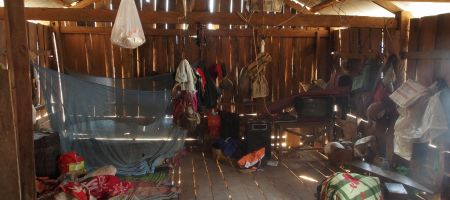
The common room of our host’s house. The house had two rooms, kitchen and common room. Like all the other houses, it is built on stilts. The area below the house is where the firewood and other stuff is kept.
The prime use for electricity are electric light and television. (Mobile phones is something they probably already had before: There are small mobile communication towers around that solely work with solar panels attached to the top. One mobile network has reception there.)
The biggest change, a cultural change, a change in ideas, morality, cravings and consume behaviour is in my opinion brought by the television. The family we stayed at was one of the few homes that already bought themselves a TV. I don’t know what the family used to do in the evening when they returned from the fields and woods one year ago, but when we were there, their entertainment consisted of zapping around in the various Thai and Lao TV channels. We had the impression that the advertisements were amongst the more interesting things for them. Not too surprising, in my opinion.
Only our host, an Akha soldierman actually interacted with us. Excluding the grandma, who was smoking (probably) opium the whole time in her corner, the rest of the family was under the spell of the TV.
After dinner, we sat together with the soldierman, his wife and our guide and played spin-the-bottle as a drinking game for Lao Lao (the wife did not drink). A little unsettling was that actually it was not a bottle that was spinned but the fried head of the chicken that we ate for dinner earlier. I watched the chicken in its long death struggle: They kill them here by strangulating them.
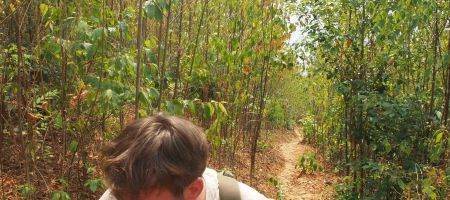
Day two surprised us with an hours long steep hike up the mountain at 34°C on a cloudless day.
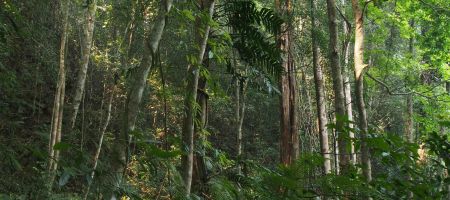
… and a walk through some proper primary forest, jungle.
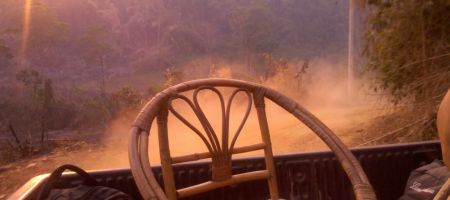
After we reached the road, we drove back to Vieng Phouka in a pickup. Those wicker chairs were for intended for us to sit on. After an almost-accident with an overtaking truck that was heading for a head-on collision with us and our driver’s abrupt evasion manoeuvre, however we sought it to be safer to sit on the floor. Chris almost fell off the pickup there.

